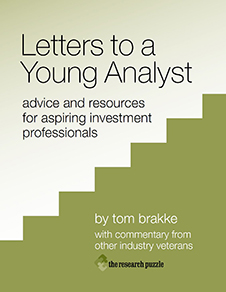
- Thursday, January 21st, 2010
- unbiased industriousness
-
Every now and again, a phrase sticks in your head. I’m not above grabbing them for blog titles,the research puzzle | As was the case with “situational awareness” after a pair of Northwest pilots claimed to have lost it a few months ago. and this one comes from an email sent to me more than a year ago by a former colleague.
He and I have had long-running discussions about what should be expected of investment analysts, from the tools of the trade that they need to learn to the type of individuals that seem to find success. It was within that context that he wished for “unbiased industriousness” from himself and others that are charged with analyzing investments. A better short description of excellence could not be found anywhere.
The investment business touches all of our lives. The proverbial man on the street is faced with decisions about how to deal with the complexity of the markets and uncertainty regarding intermediaries that proclaim expertise and offer recommendations. Those a bit better off financially might have a wider circle of advisors, but face many of the same issues. So too the fiduciaries at foundations and the like, who may or may not have higher levels of experience, but probably have more information with which to make their decisions. Those in the investment business, charged with making those choices themselves, often must rely on others, from co-workers to brokers of securities, for input.
It is a chain of dependence for all of us, and we could ask nothing more from the links to which we are connected than unbiased industriousness.
Knowing the conflicts and misaligned incentives that affect the people with whom we deal is a starting point. Of late, Goldman Sachs has taken it on the chin for previously structuring mortgage-related products for clients and promptly shorting them after the transactions.the research puzzle | Last year, in response to Goldman’s “huddles,” I had called it “long-term stupid” for some of its choices in how to deal with clients, which could easily apply to other firms as well. In published accounts, the default adjective for the buyers of the paper is “sophisticated,” even though their purchases collapsed in price. Who knows whether they relied on Goldman for an opinion or if it was simply a transactional intermediary. It is an important distinction.
The giving of advice, whether by a financial planner in a coffee shop or a Master of the Universe in a Wall Street private dining room, should be with all the cards on the table. If there are conflicts, they should be laid out; if there are caveats, they should be provided. The range of possibilities should be explored and the advice delivered in the full light of day. Unfortunately, too much advice is tainted and biased, with the elements of analysis that it is based upon overwhelmed and overshadowed by other factors.
Within organizations, some of the same issues present themselves. It is difficult to buck the orthodoxy of the group or the inclinations of the person who signs off on your bonus. At the margin, it is easy to sell what sells, and to rationalize a tweaked and tailored version of what you really believe. The real stars are those who can avoid the behavioral pulls and deliver an unbiased evaluation.
As for industriousness, one dictionary defines it as “attentive and persistent effort.” While there are building blocks that an investment professional must use, there should be nothing rote about the process of evaluating ideas. Those who do it best are alert to every possibility and willing to doggedly pursue every avenue of inquiry. Persistence pays; you never know when you will discover that bit of information or have that flash of inspiration that makes all the difference.
Those with unbiased industriousness have the chance to be effective and trustworthy investment professionals. (A combination of book smarts and street smarts — plus the ability to communicate ideas well — round out the preferred package.) Those without one quality or the other are sure to let you down.
